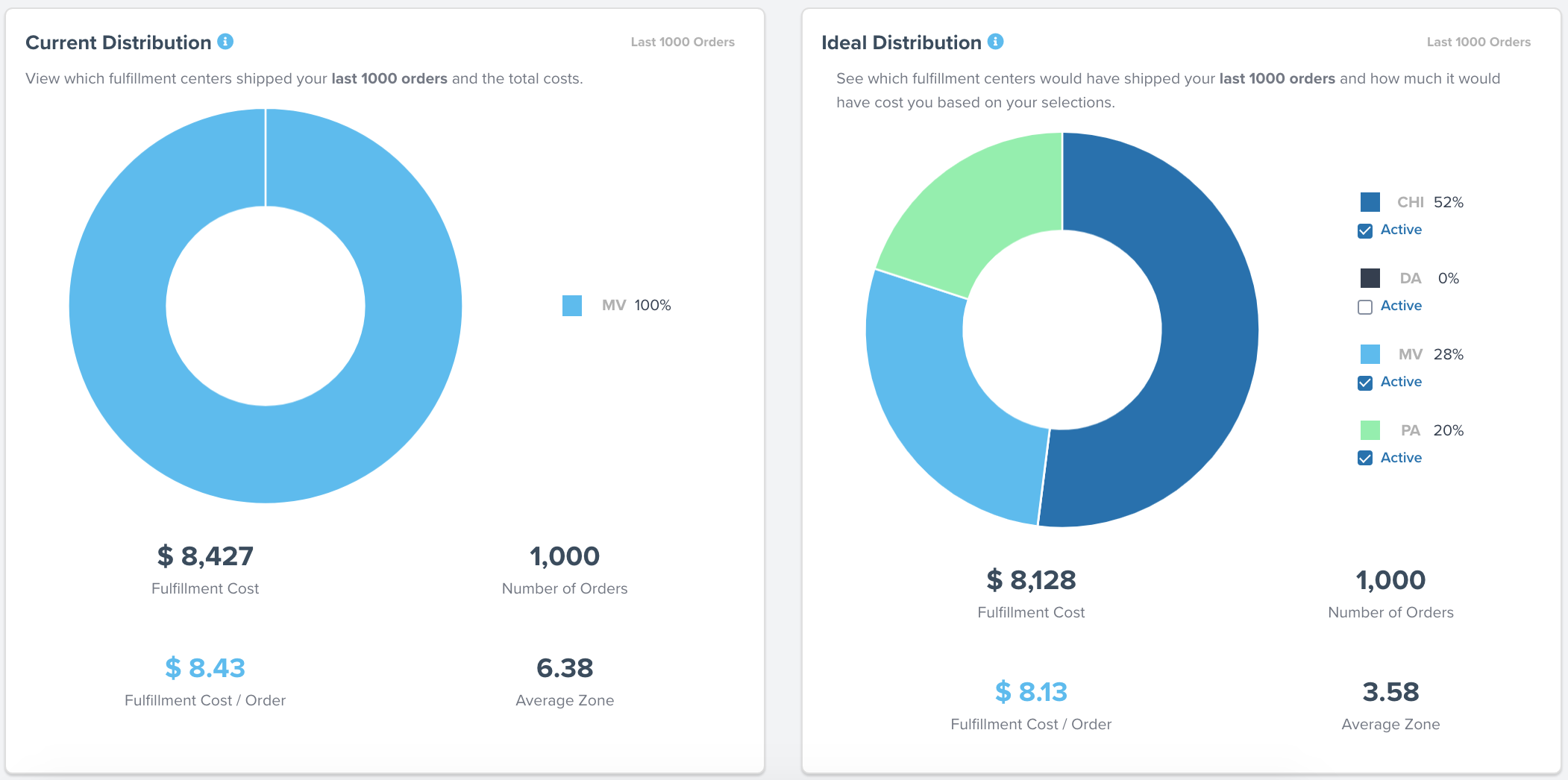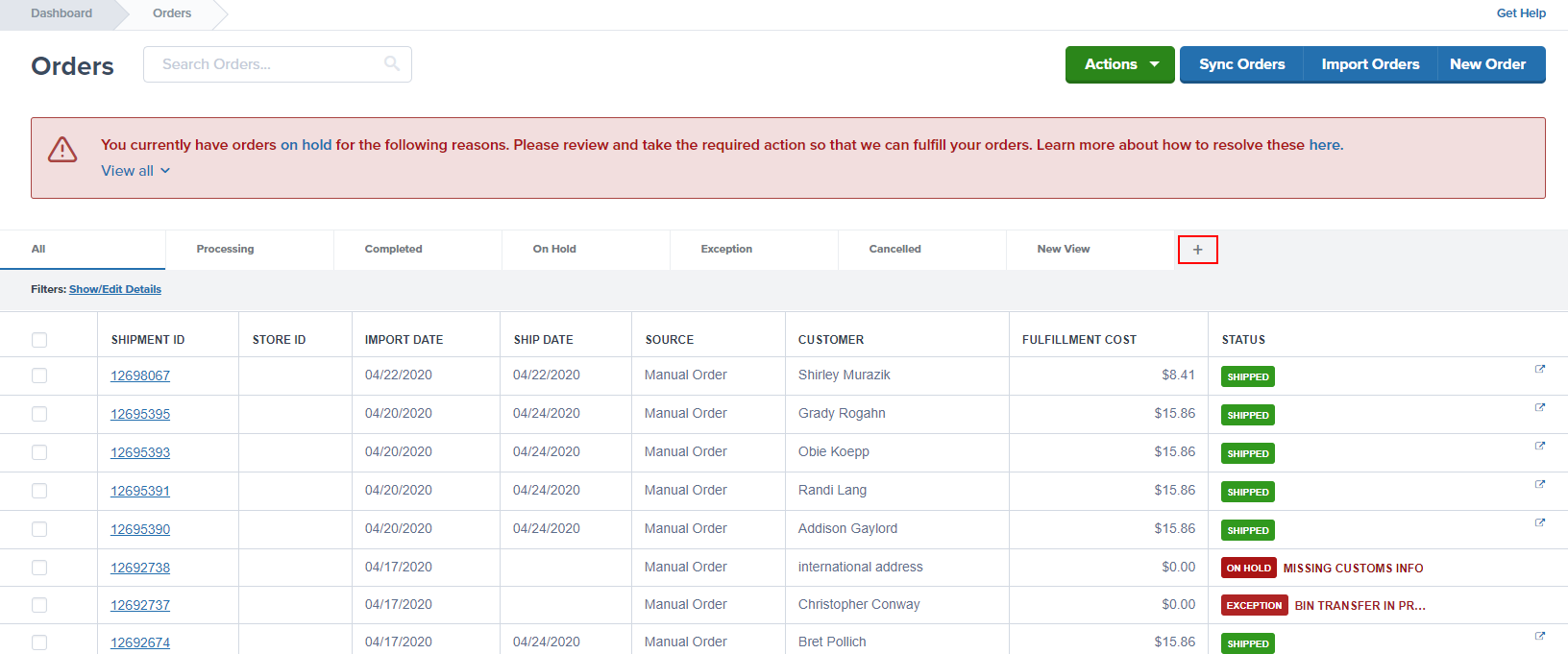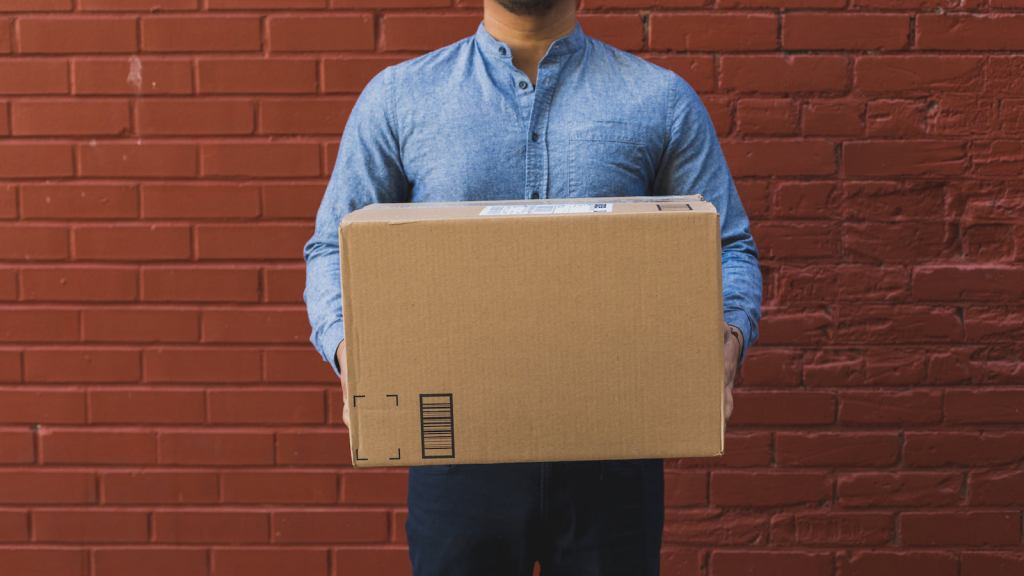Table of Contents
** Minutes
Understanding the DTC shipping process
Common challenges of DTC shipping
How ShipBob solves common DTC shipping pain points
The direct-to-consumer (DTC) space has seen explosive growth in the past few years and there’s no sign of it slowing down. eMarketer even predicts that DTC ecommerce sales in the US will amount to $151.2 billion in 2022, with a year-over-year increase of 16.9%.
To keep up with the competition in this growing market, many DTC brands are focusing on delivering exceptional fulfillment experiences, which includes investing in a shipping strategy that’s fast, affordable, and meets customer expectations.
Let’s take a closer look at what DTC shipping is, what the process entails, and examine some solutions to common challenges.
What does DTC shipping mean?
DTC shipping is the process of direct-to-consumer brands shipping orders directly to the end user instead of relying on a middleman, such as a third-party retailer or wholesaler.
Understanding the DTC shipping process
Since DTC orders are shipped directly to the customer, the ecommerce shipping process is often faster, more reliable, and cost-effective. But to establish an efficient shipping process, DTC logistics require supply chain technology, resources, and a solid shipping strategy to meet customer expectations.
To better understand direct-to-consumer shipping, here is a high-level overview of the DTC shipping process.
Receiving orders
When a customer places an order through your website or any other sales channel, an automated order processing system validates customer information before notifying an order filler.
Once the order is received and validated, the order is sent where the fulfillment process occurs (e.g., home, office, warehouse, fulfillment center).
Packing orders
During the DTC fulfillment process, orders are picked and packed before they are shipped. Some DTC brands take care of fulfillment in-house while others rent a warehouse or store inventory in a fulfillment center operated by a 3PL company
To reduce shipping costs and ensure order accuracy, orders are packed in appropriate-sized boxes or poly mailers and the right type of packing materials for each product. There are various types of dunnage brands can use to pad the product being shipping to ensure it is not damaged in transit.
Today, many brands are opting for eco-friendly packaging to minimize packaging waste and utilize more sustainable options.
Shipping orders
For shipping, DTC brands can choose which shipping carriers to partner with and what shipping methods to offer their customers. Major carriers are often a popular choice, with using regional parcel carriers as a way to save money and improve transit times for local shipments.
With Amazon setting the standard for 2-day shipping, DTC brands require a robust logistics system to stay competitive and meet customer expectations around fast, affordable shipping.
That’s why many DTC brands often choose to outsource fulfillment and shipping to a 3PL meet these standards.
“Speeding up deliveries and keeping them affordable for customers is a top concern for us. With ShipBob, we can comfortably assign a shipping cost to each order by pinpointing the product weight and destination zip code.”
Greg MacDonald, CEO & Founder, Bathorium
Tracking shipments
Once orders are shipped, you can start tracking your shipments by integrating your carrier data into your order management system.
Integrating cloud shipping solutions or multi-carrier shipping software enables you to automatically send order tracking information to your customers directly through the channel the purchase was made.
Common challenges of DTC shipping
Though DTC shipping doesn’t involve a middleman, it still involves complex logistics processes that can be challenging to manage, including shipping.
These are some of the most common challenges when it comes to DTC shipping:
Keeping up with order volume
As DTC brands scale their logistics operations, they also experience an increase in demand. Trying to keep up with an increase in order volume becomes more challenging to manage and costly to ship.
Shipping each order in-house can be a time-consuming process. And depending on your monthly volume, shipping can get pricey, even for ground shipping.
That’s why many brands partner with a 3PL like ShipBob. Working with a 3PL that operates multiple fulfillment center locations enables faster and more affordable last-mile delivery for DTC brands.
Complex warehouse & inventory management
Even with a proper warehouse inventory management process in place, DTC brands often face challenges with managing inventory, especially if they’re shipping from multiple locations.
If your warehouse is not well-planned and managed, it will cause delays and issues during the fulfillment process. Most issues with orders stem from disorganized inventory, poor picking and packing processes, and a lack of stock control in your warehouse.
Without enough time and manpower, it’s hard to keep up with constant inventory flow in and out of a warehouse, which requires having full visibility into inventory levels at all times. A lack of visibility and real-time inventory tracking can result in poor inventory forecasting, an increase in carrying costs, and inventory discrepancies.
Slow delivery times
In addition to offering high-quality products, your customers also expect an equally exceptional shipping experience.
This can be challenging as you’re also navigating increased order volume, both of which could result in slower delivery times. Slow delivery times during peak season may also be a concern due to the limited carrier capacity.
Additionally, you will have to figure out the markets you’ll serve based on your shipping capacity. While one of the best benefits of owning a DTC brand is the ability to reach customers across the globe, international shipping is much more challenging and expensive than domestic shipping and often results in slower and less reliable last-mile delivery.
How ShipBob solves common DTC shipping pain points
Many fast-growing DTC brands partner with a 3PL like ShipBob to help solve for common DTC shipping challenges.
With ShipBob, you have access to an international fulfillment network, world-class customer support, and advanced technology to help save on costs, get time back, and reach customers across the globe.
Here is a deeper dive into how ShipBob can optimize your DTC shipping process.
Ecommerce fulfillment
ShipBob’s ecommerce fulfillment services take care of not only DTC shipping needs but the entire fulfillment process.
ShipBob ships to over more than 220 countries and territories and, in addition, operates fulfillment center locations across the globe.
For US shipments, ShipBob offers faster, affordable 2-day shipping options for qualified customers. We also negotiate discounted domestic and international shipping rates with major and regional carriers and pass the savings on to you and your customers.
ShipBob’s proprietary technology easily integrates with leading ecommerce platforms, so orders are automatically sent to our fulfillment centers, where the picking and packing process can begin as soon as possible.
“There’s a pair of Ombraz on every continent, so international shipping is very important to us — not only in terms of costs but also the customer experience.
When I found out ShipBob was expanding into both Canada and Europe, I knew we wanted to expand our physical footprint with them. This would offer us the ability to reduce taxes and tariffs that come with international shipping.”
Nikolai Paloni, Co-Founder of Ombraz Sunglasses
Inventory management
ShipBob makes it easier to track and optimize inventory in real time.
Through the ShipBob dashboard, you’re given accurate insights into your inventory data at the SKU level so you know what’s in stock at every fulfillment location. With real-time inventory management insights, you can automatically set reorder notifications to avoid stockouts.
Plus, ShipBob’s technology offers advanced data and analytics which provides you with optimal inventory distribution suggestions and demand forecasting based on historical sales data.
This allows you to anticipate how much inventory to reorder and how to distribute stock between multiple fulfillment centers.

Custom packaging
Creating a unique brand experience is important for scaling DTC brands. In addition to standard packaging at no extra cost, ShipBob allows the use of branded and custom packaging.
Custom packaging adds to the unboxing experience because it allows you to increase the perceived value of your products while making a great first impression.
ShipBob partners with leading packaging solutions to offer customized and eco-friendly packaging options. You can view our packaging partners here or learn more about ShipBob’s custom packaging services here.
Order management & tracking
ShipBob’s ecommerce software simplifies your order management process for you with real-time tracking features.
It integrates with your ecommerce store and automatically captures sales order data. By eliminating the need for manual input, it speeds up the process and improves accuracy.
From the ShipBob dashboard, you can:
- View the status of each order
- Update, edit, or cancel an order
- View the estimated ship date
- See your fulfillment costs
For more details on ShipBob’s order management tools, click here.

“Compared to other warehouses we’ve worked with, ShipBob processes orders so quickly to get them out the door faster. It’s fun to see orders shipping out instantaneously. I love how fast and efficient ShipBob is.”
Harley Abrams, Operations Manager of SuperSpeed Golf, LLC
Returns management
ShipBob’s comprehensive fulfillment services also include taking care of your ecommerce returns to provide a seamless customer experience.
No matter how many ShipBob fulfillment centers you use, all returns can be created and tracked through ShipBob’s dashboard. From here, you can view detailed information and track the return by the returned item’s ID.
You can also integrate your returns management system with the ShipBob API to automatically initiate the returns process and improve efficiency. You can learn more about ShipBob’s returns process here.
“For reverse logistics, we have also been leveraging ShipBob’s Returns API to automate and streamline our routine RMA processes. Having ShipBob handle our returns has been a huge help in reducing our daily workload, and the ability to drive this process via API is wonderful.”
Important rules and regulations around DTC shipping
DTC shipping gets a bit more complicated when shipping restricted items. There are various rules and regulations that vary by state, country or region. For information on ShipBob’s restricted items, click here.
These types of items typically require specific licenses to store and distribute, so it’s important to comply with any regulations involved to avoid legal and financial consequences.
Wondering what types of products might fall under that umbrella? The following items commonly sold by DTC brands have restrictions:
Shipping wine & alcohol DTC
In order to ship alcohol, rules and regulations vary by state. In general, DTC sellers need to use a common carrier (such as FedEx or UPS) to deliver wine and alcoholic beverages.
You will also need a direct-shipping license in the appropriate state and to pay the required taxes in the destination state. To ensure compliance, you need to register your business with the following regulating bodies:
- State Departments of Revenue
- The Federal Alcohol and Tobacco Tax and Trade Bureau
- State Alcohol Beverage Control departments
In addition, there are state-specific volume restrictions and packaging requirements.
Shipping plants & animals DTC
There are strict rules in place for shipping plants and animals, with each state having different restrictions. In general, you need to ship live plants and animals with major couriers including USPS, FedEx, and UPS.
In the case of plants, make sure to check with the United States Department of Agriculture (USDA)to find information on specific plants, including whether or not they are endangered or prohibited in the destination state.
Certain plants may also be subject to quarantine depending on the destination state, so it’s important to carefully research the state-specific guidelines to ship different types of plants.
For live animals, make sure the packages are prepared so that basic humane care and safety is provided for the animal. Shipments should be clearly marked in block lettering of at least 1-inch in height.
However, not all animals can be shipped. Some types of animals are prohibited from being shipped, including threatened or endangered species.
Shipping prescription pharmaceuticals DTC
The rules and regulations for shipping pharmaceuticals vary depending on factors such as the type of drug and destination state. Most pharmaceuticals require temperature-controlled fulfillment and shipping.
Packaging is important element of shipping medicines. Pharmaceuticals require insulated containers to protect prescription medicine from humidity, sunlight, and temperature fluctuations.
Another requirement is using a shipping carrier with the appropriate license and equipment to handle such items. Make sure to check the complete rules and regulations the FDA has in place for warehousing, shipment, and distribution of prescription pharmaceuticals.
Shipping ammunition & firearms DTC
Shipments containing ammunition and firearms cannot be shipped through USPS, but they can be shipped through FedEx or UPS. Keep in mind that you can’t put firearms and ammunition in the same package and recipients must be at least 18 years of age.
To ship ammunition with UPS, there are several restrictions:
- The type of ammunition can’t exceed 12.7 mm for rifle and pistol cartridges or 8 gauge in case of shotgun shells.
- Shipments can’t exceed 66 lbs.
All shipments must comply with the laws applicable at the federal, state, and local levels.
Shipping hazardous materials DTC
Shipping hazardous materials such as explosives, flammables, and corrosives requires accurate classification, proper labeling, and appropriate packaging.
You need to ship these items through top carriers such as FedEx, UPS, USPS, and DHL. Some carriers will also ask for additional paperwork depending on the material being transporting.
ShipBob provides fulfillment for certainhazardous materials. If this applies to your product, you’ll have the option to mark items “Dangerous Goods” in the ShipBob dashboard. Click here for more information.
“Touchland sells flammable goods that need to be shipped via ground, so ShipBob has been a great ally as they have fulfillment centers all over the US, facilitating a 2-3 day delivery time for any customer in the US.”
Andrea Lisbona, Founder and CEO of Touchland
If you’re running a DTC business and struggling with shipping operations, it may be time to switch to a 3PL. ShipBob offers a world-class fulfillment network and advanced technology to help your ecommerce business scale faster.
DTC shipping FAQs
Here are top answers to questions about DTC shipping.
What is DTC in shipping?
DTC shipping refers to brands that ship products directly to the end customers rather than relying on a third-party retailer to reach their customers.
Can you ship alcohol direct-to-consumer?
Alcohol can be shipped direct-to-consumer in some states, although you have to follow the state-specific rules and regulations for each destination.
What are the best tools for DTC shipping automation?
There are plenty of tools and technology to assist with DTC shipping. For example, ShipBob shipping technology easily integrates with leading ecommerce platforms so orders are automatically sent to the closest fulfillment center where the picking and packing process can begin.
What DTC products can ShipBob manage?
ShipBob manages fulfillment of DTC products in a wide range of industries including (but not limited to): apparel, electronics, food and beverage, cosmetics and personal care items, digital health products, and home goods. Wondering if we can fulfill your products? Request a quote to see if we’re the right fit.






